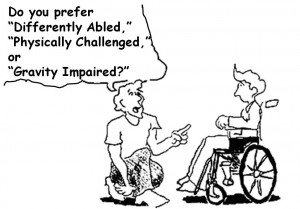“Once you label me you negate me.” ~ Soren Kierkegaard

What do you want to be called?
As a wheelchair user, I encounter this question more than most folks. Sometimes it’s directed toward me personally, but more often it comes up in an article or interview. The question-behind-the-question is really “How can we label you in the least offensive manner?”
Of course I have my own sarcastic answer …

But the question-behind-the-answer is “Why do I need a label?”
I get that labels have their uses—they need something to put on those cool blue signs that keep people out of my personal parking spaces. But relationally, labels divide the world into “us” and “them.” They’re an artificial way of identifying good guys and bad guys and obscuring the individual behind the mask.
You’re a conservative—okay, now I know everything about you, right? You voted for him—and now I know whether we’re friends or enemies. You drive this kind of car or belong to that organization—now I know whether to invite you for dinner. Really?
I think it’s a lot more complex than that.
JUNIOR HIGH SCHOOL
In twenty-two years of teaching math from a wheelchair, my students taught me a priceless lesson. They cared much more about how they were treated than whether the teacher stood or sat. When I approached them with dignity and respect I had a chance to impact their lives.
Beneath their cliques and weird hair and self-defining clothing, they understood that I was much more than my mode of transportation. Sometimes when I listen to the divisive political rhetoric I wonder whether we’ve advanced beyond eighth grade in our relationships.
If someone wants to know how I describe myself, here’s my answer:
I’m a guy with gifts and challenges. To navigate life effectively, I must find ways to capitalize on the gifts and overcome the challenges.
And I’d add a question: How does that make me different than you or anyone else?
Defining The Circle with labels seems artificially exclusive. That’s why I don’t describe Bouncing Back as a “Christian” blog. I certainly write from a Christian worldview, and I don’t disguise or apologize for that. But I want a broader circle, which is why I prefer Expanding My Circle with an attraction model composed of broad principles. Some folks still choose not to join, and that’s okay. Any worthwhile circle needs a defining boundary that people may not wish to cross.
But I love it when people who aren’t sure about Jesus show up and enter the conversation. I’m not trying to change or fix them, and I certainly don’t want to label them. I simply wish to connect, engage, and see what we can learn from each other.
The great part of an attraction model is that you don’t need to obsess about those outside the circle. You get to be inside, which means you live within the core values that matter most to you.
And you get to trust that, somehow, the folks who show up are the ones who are supposed to be there.
What labels tend to artificially separate you from others?
Man is the only critter who feels the need to label things as flowers or weeds.
